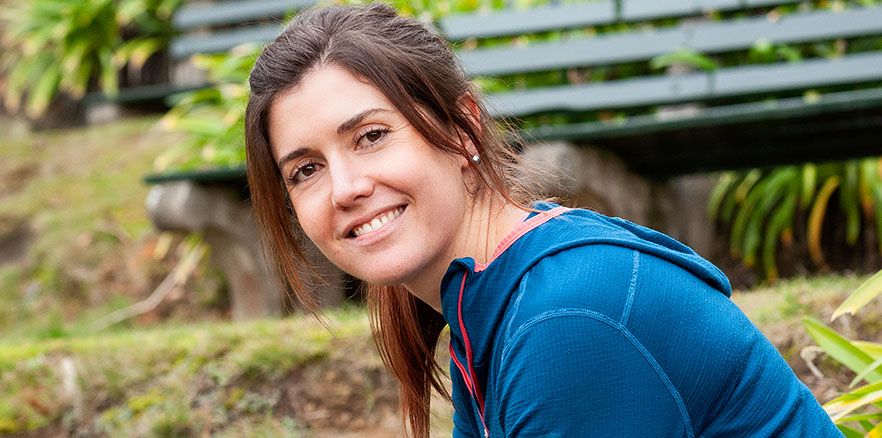
Dr Kate Thomas
Dr Kate Thomas is turning up the heat in her research, both literally and metaphorically, pushing the boundaries, collaborating widely and winning awards and research grants.
Grandma's traditional suggestion of taking a hot bath as a remedy for a number of ailments might not be just an old wives' tale.
Dr Kate Thomas (Surgical Sciences, Dunedin School of Medicine) is researching cardiovascular and cerebrovascular responses to exercise and environmental stressors such as heat, cold and hypoxia, to better understand and apply these stressors for health benefits for a range of common chronic conditions.
Working with colleagues from the School of Physical Education, Sport and Exercise Sciences, Professor Jim Cotter and Dr Ashley Akerman (now Ultromics, UK) and Professor Andre van Rij (Surgical Sciences), Thomas examined heat therapy compared with exercise in patients with Peripheral Arterial Disease (blockages in the arteries of the legs affecting blood flow to leg muscles).
“Many of the things that happen when we exercise also happen when we get hot."
Half the group completed walking exercises while the other half sat in a spa pool for up to 30 minutes three to five times a week. Both interventions were associated with improvements in walking distance and reduced blood pressure after 12 weeks.
The paper by Thomas and collaborators describing this study was awarded Best Research Article 2020 by the American Journal of Physiology – Heart and Circulatory Physiology, based on citations and downloads.
Zimbabwean-born, Thomas studied Exercise Physiology in South Africa, then worked with Professor Phil Ainslie (Physiology, Otago, now University of British Columbia Okanagan, Canada). This role included a trip to Nepal to undertake high altitude physiology research.
“Working with Phil really opened my eyes to research. He's brilliant and wildly enthusiastic about integrative physiology.”
On graduating with her Otago PhD, Thomas was awarded a Health Research Council Emerging Researcher First Grant for three years – extended because of COVID. This funded Dr Brendon Roxburgh's PhD examining heat therapy and high- intensity upper limb exercise training for improving fitness and physical and subjective health in patients with severe lower limb osteoarthritis awaiting knee or hip replacement.
“Many of the things that happen when we exercise also happen when we get hot. There's substantial overlap. Your body temperature rises, your blood pressure goes down, your heart rate goes up, the blood flow to your skin and muscles increases. We're investigating the common mechanisms to find which of those elements are most useful on their own as potential therapy for people who face barriers to exercise, and to better understand the complexity of exercise itself.”
Thomas, Roxburgh and Cotter have received funding from Pūtahi Manawa Healthy Hearts for Aotearoa New Zealand CoRE to further study the effects of heat therapy on high blood pressure. “We're fine-tuning our approaches for optimum effect: how long, how hot, how deep the water should be.
“Our goal is to develop effective, accessible, equitable lifestyle interventions to prevent or reduce the impact of chronic health conditions such as osteoarthritis, cardiovascular disease and dementia. Although exercise is my primary interest, there are people who could benefit from alternative approaches to improve cardiovascular health.”
Thomas also has a Lottery Health Research Grant with Dr Travis Gibbons (now University of British Columbia Okanagan, Canada) and Professor Cliff Abraham (Psychology) examining the effects of exercise and intermittent fasting on markers of brain health.
“We use complex and invasive protocols in a young, healthy population to expose the mechanisms and then optimise these stressors for application in clinical populations. These are some of the most challenging, fascinating and fun experiments to perform.
“I've been lucky in choosing incredible mentors and supervisors, as well as exceptional postgraduate students. I love collaborating, learning from other disciplines, and I'm very excited when I find something I'm curious about. I just love the whole investigative process of research.”
Recent awards
- Best Research Article, American Journal of Physiology – Heart and Circulatory Physiology (2020)
- HRC Early Career Researcher Award (2018)
- International Union of Phlebology Research Fellowship (2017)
Funding
- Health Research Council Emerging Researcher First Grant
- Pūtahi Manawa Healthy Hearts for Aotearoa New Zealand CoRE
- Lottery Health Council
- HeartOtago
- Healthcare Otago Charitable Trust
More stories about early career researchers
This story is part of the research publication 'He Kitenga 2022: Talented Futures', which presents the different pathways into research that early career researchers follow.